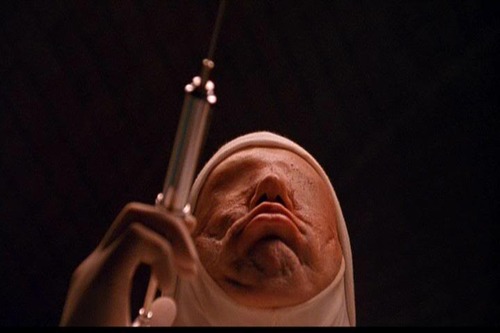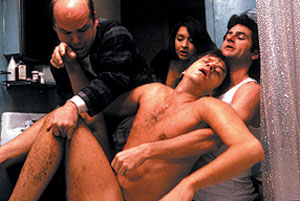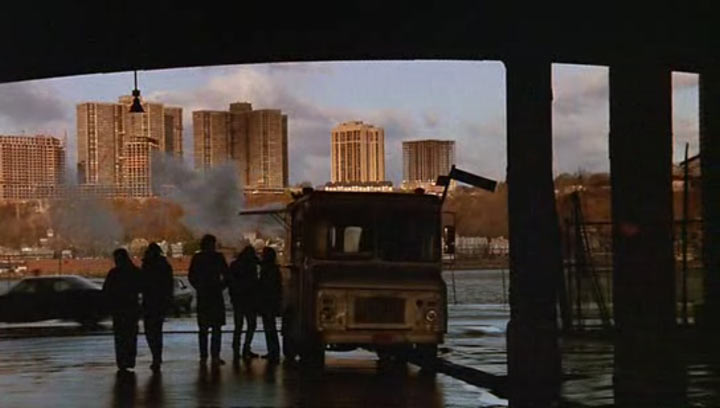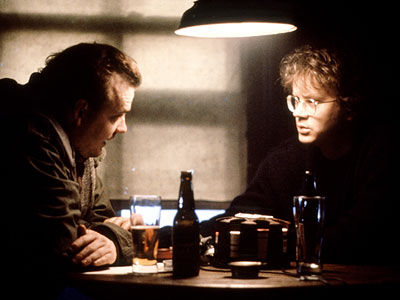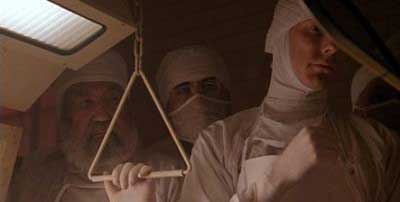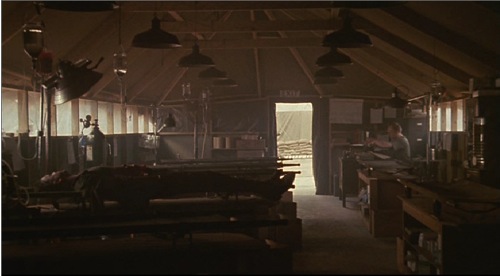From the Chicago Reader (November 16, 1990). This film has recently come out on Blu-Ray. — J.R.

JACOB’S LADDER
*** (A must-see)
Directed by Adrian Lyne
Written by Bruce Joel Rubin
With Tim Robbins, Elizabeth Pena, Danny Aiello, Matt Craven, Pruitt Taylor Vince, Jason Alexander, and Patricia Kalember.
“Around twenty-four hundred years ago Chuang Tzu dreamed that he was a butterfly and when he awakened he did not know if he was a man who had dreamed he was a butterfly, or a butterfly dreaming he was a man.” The sense of metaphysical free-fall conveyed in this sentence from Jorge Luis Borges’s great essay “A New Refutation of Time” is like the disorientation one feels after watching a gripping and involving movie — a movie like Jacob’s Ladder, for instance. Like Chuang Tzu, one isn’t quite sure whether one has just left a dream, just entered one, or embarked on some magical if unsettling combination of the two. I tend to be partial to movies that traffic in these systematic displacements of reality — starting with Alain Resnais and Alain Robbe-Grillet’s masterpiece Last Year at Marienbad (1962), the locus classicus of this genre, continuing through much less radical examples like Fellini’s 8 1/2 (1963), and extending even to minor forays like last summer’s Total Recall. To enjoy a movie usually means to agree to be fooled into accepting a story, and any movie that acknowledges some part of that deception, even momentarily, paradoxically takes me into its confidence.
Narratives of this kind frequently oblige the viewer to creatively fill in certain gaps and resolve anomalies in the story. This invitation to collaborate with the storyteller is of course a standard technique for certain directors even when they aren’t dealing with displaced reality. Orson Welles told an interviewer in 1938 that, as a stage director, “I want to give the audience a hint of a scene. No more than that. Give them too much and they won’t contribute anything themselves. Give them just a suggestion and you get them working with you. That’s what gives the theater meaning: when it becomes a social act.” But in the case of certain displaced narratives that abound in ambiguities, this process can be a trap, if one mistakenly concludes afterward that one’s imagined story and the film’s story are exactly the same — if, in short, the “social act” performed by filmmakers and audience is a confidence trick performed on the latter by the former.
My sour memories of Fatal Attraction did not lead me to expect much pleasure from Adrian Lyne’s next movie, so liking Jacob’s Ladder at all came as something of a surprise. True, the new picture has some of the same opportunistic slam-bang pyrotechnics, all aimed directly at the gut, including a heavenly view of yuppie family bliss and an infernal view of New York City that play together like a cloud and a thunderclap. This time, however, the undertow of anxiety is provoked not by an uppity independent woman’s demands and revenge but by a confused and traumatized Vietnam vet’s slippery grasp on reality. And the likable performances of the lead actors, especially Tim Robbins and Elizabeth Pena, convince me that the movie is about something real — something, moreover, that can’t be reduced to the prosaic facts of one person’s life.
The perpetual displacements experienced by Jacob Singer (Robbins), rudely awakening from one dream only to find himself in another, carry the appeal of a thriller, as they do in Total Recall. Jacob wakes from a troubling nightmare/memory of Vietnam in 1971 — some of his buddies are undergoing mysterious violent seizures just before an enemy attack, during which he gets wounded by a bayonet — to find himself on a subway on his way home from work at the post office, about six years later. At this point he immediately experiences a series of other troubling displacements, or moments of disorientation. (He glimpses two posters in the same scene, one that clarifies that it’s a New York subway and another that plants a major clue about the story to come.) One silent, staring passenger refuses to respond to his query about whether they’ve passed Bergen Street, his stop; and just before getting off at Bergen Street, he briefly glimpses what appears to be the exposed penis of another passenger who’s sleeping under a sweater. Then he finds that all the exits on his side of the tracks are locked — a familiar if irrational sort of New York experience — and gingerly crossing over to the other side, he nearly gets run over by another train; all the passengers seem to be looking out at him, and one of them, who appears to be eerily masked in white, slowly waves at him from the last car.
At home in the Brooklyn flat he shares with his girlfriend Jezebel (Pena), who also works at the post office, he has another Vietnam nightmare. When he wakes, Jezzie hands him a packet of old snapshots delivered by one of his sons when he was asleep, and we learn that he was married and had three sons before he went away to Vietnam, and that one of his sons, Gabe, died before he left, a memory that causes him to weep.
Many other displacements follow — some relatively realistic, some apparently phantasmagoric, some poised ambiguously on the borderline between the two. Jake leaves the post office because his bad back is bothering him; has a session with his chiropractor friend Louis (Danny Aiello); gets chased on a bridge by a car and seems to see the same white-masked phantom inside it; finds that his usual doctor at the clinic has died in a mysterious car accident. (The receptionist, who has no record of either his name or his doctor’s, briefly exposes a strange growth on her head when she leans over.) Later, he freaks out and collapses at a party, passes out in a bathtub full of icy water, and wakes up in bed with his wife Sarah (Patricia Kalember), freezing because a nearby window is open. He tells Sarah he dreamed he was living with Jezzie, a woman from the post office whom they had met at a Christmas party, then Gabe comes into the room, asking Jake to tuck him in again. After he returns to bed with Sarah, he has another Vietnam nightmare, and wakes up in the bathtub, with Jezzie and the doctor she has called looking down at him.
Eventually the mystery of what’s happening to Jake comes to a solution of sorts; readers who don’t want revelations of the ending are advised to stop here. To leapfrog a bit over some of the story, Jake winds up in touch with some of his buddies from Vietnam, most of whom are experiencing similar visions of hell and being pursued by demons. One of them perishes in an accident — a car explodes — that resembles the accident that killed Jake’s doctor; the explosion nearly kills Jake as well. The buddies find a lawyer who agrees to help them try to uncover what happened to them in Vietnam, but soon afterward the lawyer and all his cohorts mysteriously drop the case. Jake gets picked up by a couple of thugs who threaten him to keep his mouth shut; he breaks away, and winds up in the hospital with a slipped disc, after having his pocket picked by a jovial Santa Claus. Finally he’s contacted by a former LSD chemist who confesses that during the war he was coerced by the Pentagon into developing a new drug, called the Ladder, designed to make soldiers more aggressive in combat. The Army experimented on Jake’s battalion by slipping the drug into their food; the result was that the soldiers wound up attacking and killing each other.
After hailing a taxi, Jake arrives at the plush apartment he once shared with Sarah and his sons, where the doorman warmly welcomes him back. After lingering there alone for a while, he glimpses Gabe at the foot of a staircase. Gabe leads him up the stairs toward a burst of heavenly light, which is revealed to be a light over his body in a hospital unit in Vietnam. He lies with a peaceful smile on his face, and two doctors pronounce him dead. A closing title tells us that it has been reported that the Army used a hallucinogenic drug called BZ in experiments during the war, and that the Pentagon denies it.
A first viewing of the film convinced me that its thrust was partly political, and that it was relatively outspoken for a commercial movie – -a statement about the irreparable wounds the Vietnam experience has left on the American psyche, and how the Pentagon was partially accountable. A drug functions simultaneously as the probable cause for Jake’s derangement and as a metaphor for the effects of the callousness and confusion of that war on this country as a whole, but I didn’t see it as any sort of neat solution to the puzzle of Jake’s life. I was far from convinced that Jake’s death in Vietnam had any privileged reality, that it represented any key to what was real and what was false in the story. While it obviously provided some closure to the film, I found it hard to swallow that everything before it was a deathbed dream or vision like that of the soldier in Ambrose Bierce’s story “An Occurrence at Owl Creek Bridge,” as some of my colleagues have concluded. (If that’s the case, then Jake’s belated discovery about the Ladder is canceled out. This in turn makes virtual nonsense of the final printed title about BZ, unless we figure that Jake’s deathbed vision either includes some supernatural intuition of the truth or is followed by six more years of posthumous life as a ghost before he makes his discovery.) I felt that the film offered a certain emotional coherence about Jake’s life, but not any final narrative coherence, because the effect of Vietnam itself — shattering Jake’s life into a collection of disconnected pieces — made such coherence impossible. The film was about what made coherence unthinkable, not about any specific solution to a puzzle.
I don’t entirely reject this reading now, but a second look at the film has persuaded me that it’s even less coherent as a narrative than I had imagined, and less coherent politically (if not emotionally) as well. The movie abounds with suggestive rhymes that imply some ongoing relationship between memory and imagination, but since it’s never clear which is which, we can’t create a lucid narrative out of them, even retroactively. Gabe’s death, for instance, rhymes with Jake’s own near death when his Army buddy’s car explodes; but if in fact Gabe died before Jake left for Vietnam, why then does Jake find a letter from Gabe written to him in Vietnam inside his cigar-box collection of war mementos? If in fact Jake split up with Sarah because she asked him to leave (the only explanation that’s offered), why does everything we see of Sarah seem to contradict this?
To complicate matters further, Lyne makes frequent use of subliminal editing to conjure up Jake’s visions — images that appear so fleetingly on the screen that we’re invited to flesh them out with phantoms of our own, whatever these might be. (A prime instance occurs during the party scene, leading up to Jake’s collapse; but they’re frequently used elsewhere.) Lyne, whose background is in TV commercials, is especially adept at milking this technique for its visceral jolts; another common stylistic trait, equally prevalent here and in Fatal Attraction, is slowly panning across a room, often before the viewer has become fully acclimated to the scene or setting, creating a tension about narrative expectations that often elicits the viewer’s worst fears.
Bruce Joel Rubin’s screenplay has long enjoyed a reputation in Hollywood as a worthy unfilmed script; as far back as 1983, it was cited in American Film as one of the ten best scripts in circulation with no takers. One might guess that Lyne took it on partially as a technical challenge, although judging from both the description of the script in 1983 and recent interviews, he has toned down some of the philosophical and religious details. (In the original, Jacob was both a lapsed Jew and a failed philosopher, and his visions were apparently more explicitly religious, including demons with tails.) Enough of these have been retained, however, to give a portentous atmosphere to the proceedings; when Jake is first seen on the subway, he’s holding a copy of Albert Camus’ The Stranger, and he’s later seen poring over an illustrated edition of Dante’s Purgatorio, with books on demonology and witchcraft close at hand. Then there’s the fact that most of the film’s major characters have biblical names, which is acknowledged even in the dialogue. The film as a whole projects a certain supernatural new-age mysticism that is fully in keeping with Ghost, which Rubin also scripted — a film that recently overtook Pretty Woman as this year’s top money-maker.
What does all of this add up to politically — or, to put it in Welles’s terms, in what way does Rubin and Lyne’s effort become a social act? I’m not concerned with their intentions — a slippery matter in any case — but with effects. If in fact the Army did test a hallucinogenic drug called BZ on U.S. soldiers in Vietnam (which accords with certain reports of CIA drug experiments from around the same period), it seems unfortunate that the etiquette of film reviewing, which entails not giving away endings (and, in this case, even the meaning of the title), guarantees that most reviews of Jacob’s Ladder won’t address this issue — or even acknowledge it. As far as most reviews and ads for this film are concerned, it might just as well be another version of The Exorcist, or Total Recall for that matter — a scary fun-house ride with no serious social meaning. Most mainstream movie reviewing nowadays tends to repress any political content anyway, anything that might be construed as controversial or potentially alienating (the media treatment of Pump Up the Volume‘s nondefeatist political agenda is a prime recent example), and the additional excuse of not spoiling any fun-house surprises just plays into the hands of the same policy.
I’m relatively indifferent to whether the film is bringing up the drug experiments opportunistically or with serious intent. If they actually took place, surely it’s worth bringing them up for any reason at all. And considering that the effects of such Army “experiments” on U.S. soldiers as Agent Orange have been so underreported by the media, I wouldn’t feel unduly alarmed about the Pentagon’s welfare. Ultimately the argument that Jacob’s Ladder uses the reported BZ experiments “opportunistically” provides only another excuse for playing into the same media policy of keeping mum about the subject.
But media attention isn’t everything. At the moment I’m writing this, Jacob’s Ladder happens to be at the top of the charts. It’s hard to know whether this popularity will continue, but given this movie’s unusual grimness and complexity in relation to other popular entertainments — and the clear success of Total Recall — I think it’s worth examining why the displaced-reality genre, once the exclusive preserve of the foreign art-house movie, has so much commercial appeal at the moment.
A feeling of impotence in relation to the government and social change seems to characterize the current national mood. The predictably low turnout at the polls this month is only the most obvious symptom of a cynical conviction that corruption, incompetence, disregard of the Constitution, and above all lying are so integral to the way that this country is being run that it would be useless to try to make any significant changes. In retrospect, even the Watergate housecleaning might never have happened if the country hadn’t needed an instant scapegoat for the U.S. defeat in Vietnam. The relative tolerance and even endorsement of Iran-Contragate seem much more typical of our attitudes, pointing to a conscious desire to be deceived in political life (“Read my lips”) that, greased by the Reagan style, is wholly compatible with a desire to be deceived at the movies. It’s a desire for a kind of deception that is never total, that can be characterized rather as a suspension of disbelief.
Some of this desire for deception can be felt in the impatience of the U.S. press with conspiracy theories of any sort. The hypothesis that AIDS grew out of tests conducted by the CIA is generally scoffed at in this country but treated with a great deal more credence in the European press (as in a recent British TV report on AIDS). The same could be said of theories about John F. Kennedy’s assassination that have countered the Warren Report. Given the public’s desire to be deceived, there’s an impeccable logic in the mainstream press’s avoiding such theories, because if it were discovered that any of them happened to be true, our political defeatism would automatically become less tenable. If, for instance, it were conclusively known that the Army carried out BZ experiments on soldiers in Vietnam, then questions about the Pentagon’s present budget would inevitably arise, questions that this country has generally agreed not to ask.
It seems to me that Jacob’s Ladder is potent and expressive precisely because it gives expression and shape to this disavowal of responsibility, and places it within the only context that can make it acceptable: a state of absolute helplessness and total victimization, unsullied by a trace of guilt. What’s appealing and affecting about Robbins’s performance as Jake is the way he remains as helpless and as innocent as an infant throughout the film (the movie’s theme song, significantly, is “Sonny Boy”). His situation — haunted and controlled by ineffable forces — is one we can easily identify with. Similarly, what’s moving about the performances of Pena and Aiello is the way their characters nurture and comfort Jake like parents — roles that are also briefly assumed by Sarah and even by Gabe in the final scene. Affluence and family happiness are both lost somewhere in Jake’s past, and finding them again in a deathbed dream is oddly satisfying as well as poignant, because it avoids any necessity of having to fight for them. (Vague hints of a possible afterlife suggest that Jake will somehow regain them anyway, sumptuous apartment and all.) Even fighting for self-knowledge proves to be a losing game, the game of a child who underestimates the strength and arbitrary whims of the ruling gods (i.e., the Pentagon) who sealed his fate many years ago.
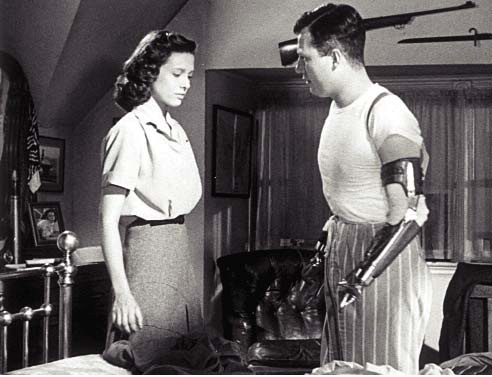
Jake’s character recalls the touching armless World War II veteran in The Best Years of Our Lives (1946), played by an actual armless vet (Harold Russell) — though he had the consolation of knowing he was fighting for something worthwhile. I’m reminded equally of the late Robert Warshow’s remark that that character’s passivity creates the film’s “most dramatic scene,” when the woman he loves has to undress him and put him to bed. “Beneath that scene’s pathos,” Warshow wrote, “one feels a current of excitement, in which the sailor’s misfortune becomes a kind of wish fulfillment, as one might actually dream it: he must be passive; therefore he can be passive without guilt.”
Insofar as Jacob’s Ladder provokes feelings of anger about how American soldiers in Vietnam were brutalized and exploited, it is doing something important; insofar as it is celebrating romantic yuppie fantasies of family contentment, it is not much better than Ghost. And insofar as it provides an index to our present fragile grasp of what’s real and what isn’t, it’s simultaneously realistic and symptomatic of the holy mess our heads are in. Playing both his movie and his audience like a gigantic Wurlitzer organ, Lyne seems to have his fingers on all these keys at once, but whether he’s playing these resonant chords for edification or for further obfuscation is a question that’s worth thinking about. Frankly, I don’t know the answer, and I wonder if he and Rubin really know either.

